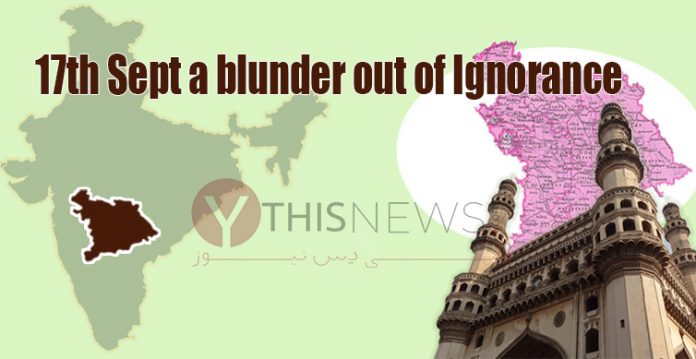Religious tolerance in Muslim ruled Hyderabad’ an unparallel example
Disapproving with the demand to celebrate 17th September as Liberation Day, the senior historian of the city Prof.Nanak Singh Nishter said, “Religious tolerance of the Muslim rulers of Hyderabad state, who ruled more than 700 years, is an incontrovertible fact and unparallel example.
Some political quarters, having no knowledge of historic facts of the state are trying to gain political mileage by demanding Liberation Day celebrations just to Hurt the sentiments of a particular community.
Recalling the accounts of the partition while talking with Y-This News, Prof.Nishter said, “Operation Polo, which was also known as the annexation of Hyderabad state by the Indian Army in September 1948, was actually happened 13 months after the independence of India. Muslim families of north India, who were ravaged by the brutal bloodshed during the partition, flocked to Hyderabad in myriad leaving behind everything they have inherited within the search of a safe haven as Hyderabad state was ruled by Muslims.”
Disapproving the reports of a confrontation between two armies during Operation Polo, he said, “No military confrontation happened between the two sides. Skirmishes were seen only between Razakaars and the Indian forces.”
Prof.Nanak Singh referring to the Book ‘The Seven Loaves’ written by the then Major General of Hyderabad Army Syed Ahmad El-Edroos, said, “Major El-Edroos himself mentions in the book that no confrontation between two armies has happed. As a Commander-in-Chief of the Hyderabad Army, he himself has surrendered before the Indian army following the instruction of the then Nizam of Hyderabad, Mir Osman Ali Khan.”
When there is no confrontation between the two armies, where is the question arose of defeating any force to capture Hyderabad? The whole episode is just a ‘willful compromise with the situation’ and a mutual agreement between the two armies to avoid bloodshed,” he explained.
As a result of this gesture, he said, several senior officials of the Hyderabad Army were assimilated into the Indian Army and awarded coveted posts. Brigadier Sayeed and General Zaki are some of the prominent officers’ of the Hyderabad Army who were assimilated into the Indian Army after the annexation and were placed on high ranks in the army.
Similarly, Nizam Mir Osman Ali Khan Bahadur was designated as Rajparmukh, a post identical to that of the present-day governor and he was remaining on the post till 1956 when the Hyderabad state was bifurcated into three separate parts.
“There were several other historic accounts and events of Hyderabad states’ merger with the Indian Union mentioned in his book and people well versed with these facts knows this for certain,” he asserted.
Recalling the religious tolerance of Nizam Mir Osman Ali Khan, Prof.Nishter said, “Hindus were enjoyed several coveted posts in Nizam’ government. Several high court judges, kothwals, and other dignified posts were held by members of the Hindu community.
“There was no discrimination ever exist in the Nizam era on the basis of religion as both the communities Hindus and Muslims were collectively believe in peaceful co-existence and share their culture with utmost respect and reverence,” he recalled.
Explaining that the Razakaar movement was flared up due to the support of Muslims who came from outside Hyderabad with the wounds of partition on their soul, he said, “Headed under the leadership of Qasim Razvi – a haranguer leader with the didactic tone, the movement soon turned into an armed wing of Hyderabad.
“The whole gamut of the emotion of Muslims, who were tormented into the hands of others during the partition, was ramped up the movement. However, only the Razakaars were engaged with the Indian forces while the Hyderabad Army decided to surrender. There is no iota of truth in saying that operation Polo saw fierce engagement between India Forces and the Hyderabad Army,” claimed Prof. Nishter.
“Though both the sides were identically suffered from the brutal violence of the time, no one should take an upper hand over others as everyone carries the wounds of the chaotic situation created out of the partition,” he asserted.


